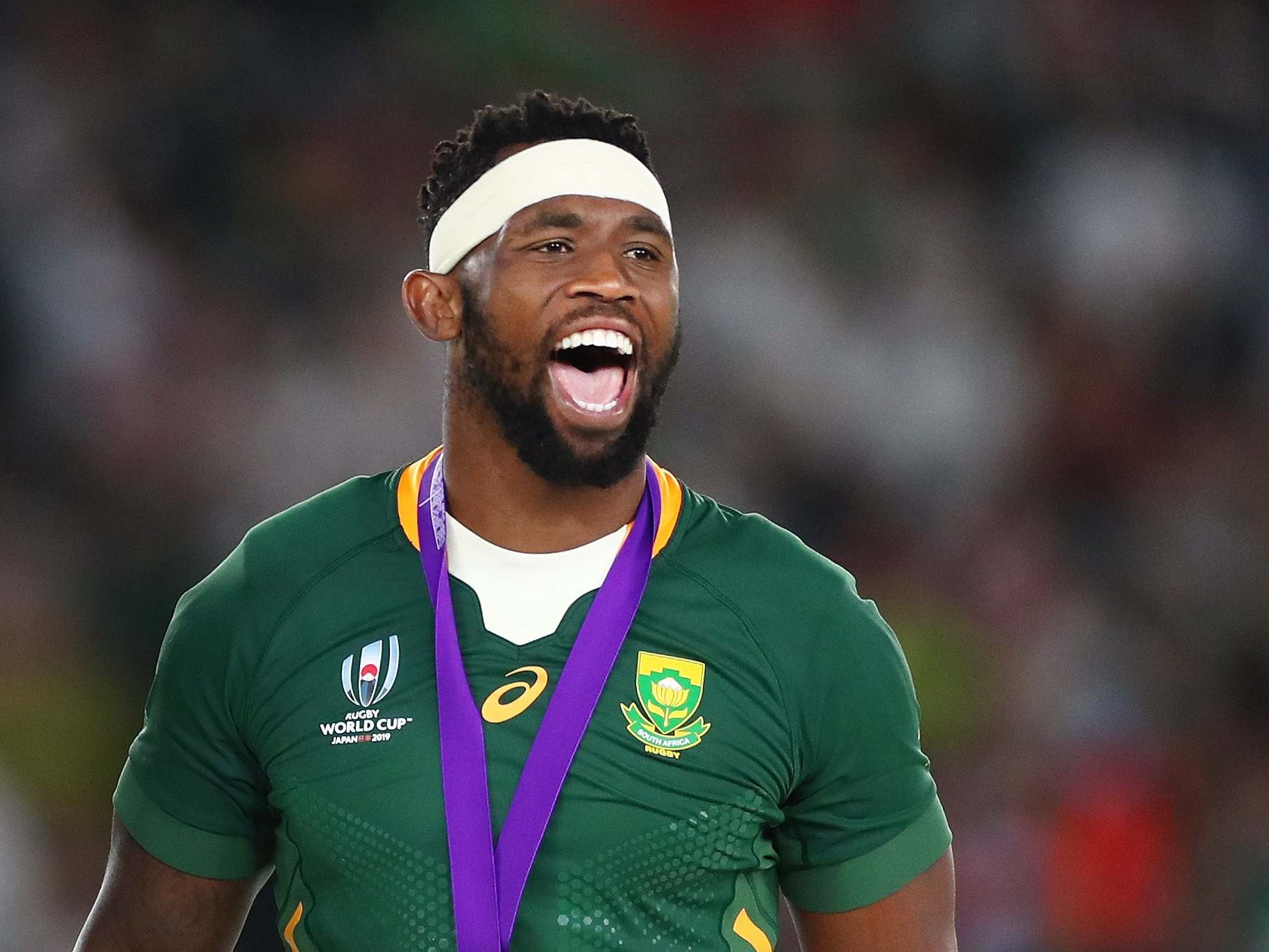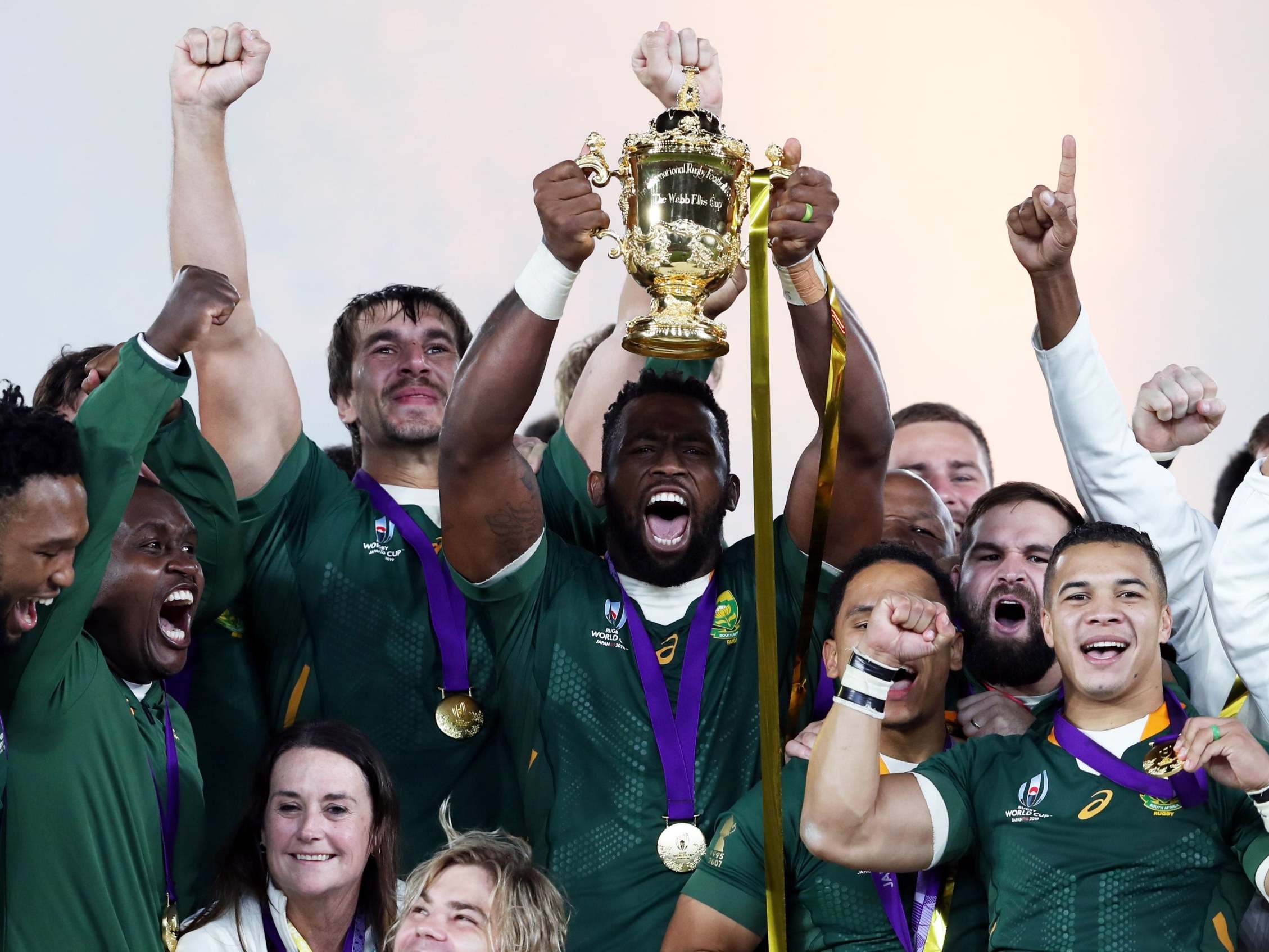Rugby World Cup 2019: How Siya Kolisi’s Springboks brought hope to troubled South Africa
The captain’s ascent to the pinnacle of the sport speaks volume of the realities of life in South Africa – but also points to what can be achieved in the face of adversity and tragedy

Your support helps us to tell the story
From reproductive rights to climate change to Big Tech, The Independent is on the ground when the story is developing. Whether it's investigating the financials of Elon Musk's pro-Trump PAC or producing our latest documentary, 'The A Word', which shines a light on the American women fighting for reproductive rights, we know how important it is to parse out the facts from the messaging.
At such a critical moment in US history, we need reporters on the ground. Your donation allows us to keep sending journalists to speak to both sides of the story.
The Independent is trusted by Americans across the entire political spectrum. And unlike many other quality news outlets, we choose not to lock Americans out of our reporting and analysis with paywalls. We believe quality journalism should be available to everyone, paid for by those who can afford it.
Your support makes all the difference.It takes moments of true rarity and majesty for sport to transcend the perimeters of the pitch. They may seem fleeting, ephemeral in nature, but can often carry a legacy that burns bright in the pages of history. On Saturday night, with the Rugby World Cup at its conclusion after seven long weeks, we were treated to such a sight.
As Siya Kolisi held the Webb Ellis Cup high above his head to mark South Africa’s enthronement as world champions, you could sense the unseen scale of the occasion. Amid the agony and ecstasy wrapped up in this coronation, there was something different, something intangible hanging in the air.
Hope. Pure and simple. It was etched on the face of Kolisi as he stood among his teammates beneath the golden ticker-tape and fireworks, a leader and symbol for the people of South Africa. It was there in the smiles of the fans, an ocean of colours and creeds, some drawn from privilege, some from poverty. It was there in Rassie Erasmus’ moving post-match soliloquy, as he touched upon the honour, not the burden, of providing light for a nation living under the shadow of division.
Because for a country that continues to bear the ugly scars of its divided past, the sight of the first black South African leading the Springboks to glory carries far more weight and worth than the old gold pot placed between his hands in Yokohama.
To understand Kolisi’s present, we must look back to his past. His ascent to this rarefied pinnacle speaks volume of the realities of life in South Africa – but also points to what can be achieved in the face of adversity and tragedy.
Born to teenage parents in the township of Zwide in Port Elizabeth, Kolisi’s early life was rooted in destitution. As a child, he would sleep on a pile of blankets on the floor and often went days without any food besides a single slice of bread. On the rugby pitch, his first provincial trials were played in boxer shorts because he had no other kit, while boots and socks were a luxury.
His mother died when he was just 15, followed shortly afterwards by his grandmother who had taken in him. There was to be no let-up for the young Kolisi as he chased wild dreams of what seemed to be the impossible.
But rugby would offer the future Springbok an escape and release from his hardships. Rising through the ranks of the game during his formative years, Kolisi slowly but surely broke free of the social constraints that, to this day, 25 years on from the end of apartheid, demarcate the different demographics of South Africa’s diverse population.
The truth is, though, few have been as fortunate and as blessed as Kolisi. The captain, along with the 10 other black players in Erasmus’ squad, stand as exceptions to the rule in a country where the discrimination of apartheid may no longer be enforced but lingers close to the surface in all walks of life.
According to a 2018 report from the World Bank, South Africa is the most economically unequal country in the world with the gap between rich and poor ever-widening. Unsurprisingly, this inequality runs along racial lines. As shown by research conducted by the South African Human Rights Commission, it is the white minority population that is more likely to enjoy a life of affluence while the country’s black citizens remain confined to the lower rungs of the socio-economic ladder – despite the promises of change and enrichment made 25 years ago.

Against this backdrop, economic stagnation, outbursts of violence, and shortages in electricity and running water plague South African society. In the political domain, the ruling African National Congress – the party of Nelson Mandela – remains vulnerable following the scandal-ridden nine-year rule of Jacob Zuma, with radicalising forces among the far-left threatening instability.
The Springboks themselves do not exist in a vacuum, immune to the discourse and narratives that dominate conversations back home. Despite his participation at the World Cup, Eben Etzebeth is facing legal charges after being accused of racially and physically assaulting two men in a late-night alteration outside a bar. The lock has denied the allegations and his involvement in the incident, which is said to have happened before South Africa flew out to Japan. The episode, though, was a reminder that the national side cannot simply detach itself from those realities of a turbulent and charged society.
As such, South Africa’s players will be acutely aware of what yesterday’s victory can mean for a country struggling to find its identity and place in the world.
“Everyone is looking at the current situation back home and things aren’t really great, so sport is something that really unites the country,” said Tendai Mtawarira in Yokohama. “We know that the Springboks are a symbol of hope and inspiration. To get this win will get people’s spirits up again and let people know that as a country, we can move forward.”
It was a similar message from Erasmus as he reflected upon how his squad handled the weight of expectation and wider tensions hanging over them ahead of the tournament.
“In South Africa pressure is not having a job,” he said. “Pressure is one of your close relatives being murdered. Rugby shouldn’t be something that creates pressure on you, rugby should be something that creates hope. We started talking about how we’ve got a privilege of giving people hope.”
In terms of the Springboks at least, that hope has been moving in a forward direction – albeit at a glacial pace. When they triumphed in Johannesburg 24 years ago there was just one black player, Chester Williams, in the starting XV. By the time of their second World Cup win in 2007, there were still only two.
In Yokohama, seven black players ran out in Erasmus’ starting side – two of whom, Makazole Mapimpi and Cheslin Kolbe, would score the crucial tries to make sure of the win over England. These stars have thrilled throughout the tournament, and in the process have put to bed any suggestions of meeting ‘quotas’. For Erasmus, quality has been the sole factor behind his selection-making.

What this progress and the success it’s yielded brings beyond the elite bubble of the Springboks set-up, it’s hard to say. But for now, the ‘privilege of hope’ is something that the country as a whole can enjoy.
For inherent in sport – right deep down in its bones – is the power to unite and bind and bring together those of different backgrounds, colours and views. Sport can cross the tribal lines, and, however briefly, create harmony in a disharmonious society.
As Erasmus said himself: “Hope is when you play well and people watch you on Saturday, have a nice barbecue and watch the game and feel good after. No matter your political differences or your religious differences, for those 80 minutes you agree where normally you disagree. That’s not our responsibility, that’s our privilege.”
For many, the poignancy of that moment in 1995 has long since faded. The sight of Mandela, clad in the Springboks blazer with a cap to match, handing captain Francois Pienaar the Webb Ellis Cup was meant to reaffirm and consolidate the merging of South Africa’s disparate tribes, races and people. In reality, the country is divided as ever.
But in Kolisi and his fellow Springboks, the promise of something new and transformative is once again bubbling away under South Africa’s tense racial climate. There’s a hope that, this time around, the power of sport endures and sustains. “We come from different backgrounds, different races and we came together for one goal,” said the captain on Saturday night. “I have never seen South Africa like this. We were playing for the people back home. We can achieve anything if we work together as one.”
Join our commenting forum
Join thought-provoking conversations, follow other Independent readers and see their replies
Comments